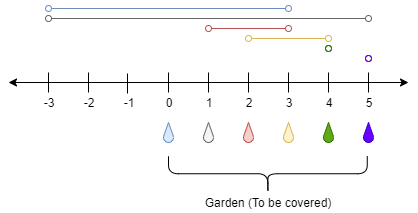Problem
There is a one-dimensional garden on the x-axis. The garden starts at the point 0 and ends at the point n. (i.e The length of the garden is n).
There are n + 1 taps located at points [0, 1, ..., n] in the garden.
Given an integer n and an integer array ranges of length n + 1 where ranges[i] (0-indexed) means the i-th tap can water the area [i - ranges[i], i + ranges[i]] if it was open.
Return the minimum number of taps that should be open to water the whole garden, If the garden cannot be watered return -1.
Example 1:

Input: n = 5, ranges = [3,4,1,1,0,0]
Output: 1
Explanation: The tap at point 0 can cover the interval [-3,3]
The tap at point 1 can cover the interval [-3,5]
The tap at point 2 can cover the interval [1,3]
The tap at point 3 can cover the interval [2,4]
The tap at point 4 can cover the interval [4,4]
The tap at point 5 can cover the interval [5,5]
Opening Only the second tap will water the whole garden [0,5]
Example 2:
Input: n = 3, ranges = [0,0,0,0]
Output: -1
Explanation: Even if you activate all the four taps you cannot water the whole garden.
Constraints:
1 <= n <= 10^4ranges.length == n + 10 <= ranges[i] <= 100
Solution
class Solution {
public int minTaps(int n, int[] ranges) {
if (n == 0 || ranges.length == 0) {
return n == 0 ? 0 : -1;
}
int[] dp = new int[n + 1];
int nxtLargest = 0;
int current = 0;
int amount = 0;
for (int i = 0; i < ranges.length; i++) {
if (ranges[i] > 0) {
int ind = Math.max(0, i - ranges[i]);
dp[ind] = Math.max(dp[ind], i + ranges[i]);
}
}
for (int i = 0; i <= n; i++) {
nxtLargest = Math.max(nxtLargest, dp[i]);
if (i == current && i < n) {
current = nxtLargest;
amount++;
}
if (current < i) {
return -1;
}
}
return amount;
}
}
Explain:
nope.
Complexity:
- Time complexity : O(n).
- Space complexity : O(n).